Strauss,R: Elektra (Thielemann)
Richard Strauss's operatic offering following Salome goes right back into the realm of powerful and manipulative women, and a hefty dose of revenge. Hell hath no fury…
Based on the ancient tale by Sophocles, much of the action has already occurred when Hugo von Hoffmannsthal's libretto takes off. The highly summarised plot is as follows.
Clytemnestra, with the help of her lover, Aegisth, has had Agamemnon, her husband, murdered with an axe in the bath. They had also planned to kill her son, Orest, but he managed to escape with help from his sister, Elektra. Clytemnestra has spent the interim years fearing that her remaining children will take revenge. Elektra and Chrysothemis are kept as servants within their own home, and treated with contempt by everyone in the household. Orest is assumed to be dead. Elektra tries to persuade her sister to kill their mother and step-father, but Chrysothemis refuses, meaning Elektra has to do it herself.
Orest is, of course, not dead, but arrives in disguise, and when he makes himself know to Elektra, goes off to finish what has been planned for years. Elektra is so ecstatic, she drops dead on the spot.
Ok, not what you may call the most overtly dramatic of libretti, however this opera is more a study in psychological torture, paranoia and revenge. Most of the drama is acted out within the music itself, and Christian Thielemann and the Munich Philharmonic pull out all the stops in creating one of the most powerful, yet transparent versions of the score you're going to hear in a long time. Thielemann has decided on just a few huge climaxes, and this allows the music to breathe as if it were from a much earlier period.
Herbert Wernicke's production is sparse, yet powerful enough to reflect the inner torture of the characters, but not enough to distract from the music-drama which unfolds before you. The main coup de théatre consists of a huge oblong-ish stage 'divider' that lets in shards of brightly coloured light, and rotates to reveal the larger scenes, yet when shut, leaves the cast to more or less their own devices, as the principal prop is the axe which is permanently wielded by Elektra (as it's the weapon that apparently killed her father, she's kept it in a particularly good condition!) and there is very little else upon which to clasp your eyes.
The direction is a little 'Robert Wilson', in that gestures are kept to a minimum and much of the singing is done towards the audience as if everything we are hearing is actually the inner monologue of the singer, yet is much more successful than the productions of Wilson that I have seen as it helps the small cast keep their own place on the relatively large stage, and makes us feel even more uncomfortable as eavesdroppers into what is one of the most murderous plots in operatic history (and there are quite a few of those!).
As Elektra, Linda Watson is quite superb, Sounding a little more tired in some places than others may well reflect a possible switch of performances for certain sections (although I've not worked out how they could do this yet…would be great to have an insight into this sort of thing in a future 'making of' at some point (?)), her overall interpretation is nothing short of astounding, making the enormous role appear a lot easier than it is. Her axe-wielding technique could do with a little more conviction, but as she has to handle it throughout I imagine it can get a bit difficult to know what to do with if it isn't actually being plunged into your mother's head.
Manuela Uhl (Chrysothemis) is also very effective, bringing a more powerful voice and drama to the role than I have heard for a while. Her seemingly innocent 'stealing' of Clytemnestra's jewels is also a rather nice touch.
The highlight for me however is Jane Henschel's astonishing performance as Clytemnestra. The character is often seen as a slightly stereotypical interpretation of pure malice and evil, yet there's a highly flawed (to put it mildly) human being here, and her stage presence is immense. Weighed down by her robes of office (both literally and metaphorically) it will be hard to find another performance so involved in such a horrible character. There is absolutely no love lost between mother and daughter here, and the tension is palpable as the ladies behave in a way which allows the hatred between both to pour forth.
The two main male roles are almost secondary to the action, but Albert Dohmen (Orest) brings great dignity to his character, and it was great to see René Kollo really ham it upas the ultra-paranoid Aegisth. The age does tell unfortunately, but the huge experience this man has of many larger operatic roles shines through any little niggles I may have about that.
The 'extra' is a 15 minute 'making of' (although I wish it were longer) in which we learn a little about the production values, and more interestingly, see a bit of the orchestral rehearsals. Nice to see that even a band like this is asked to play down continually so the voices can be heard.
The NTSC sound is excellent, with very few balance problems and the video brings out the (at times) fairly stark lighting effects nice and clearly. Close ups reveal the often excellent acting from all concerned, especially Jane Henschel.
Overall, this is a stunning performance of one of the most difficult works to bring off successfully on stage. The static production may not be to everyone's taste, and certainly, I would have preferred some contact between brother and sister at their reunion, however those who just need the music to do the talking at such moments need look no further.
Thoroughly recommended.
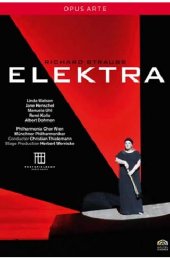
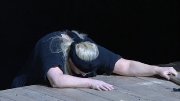
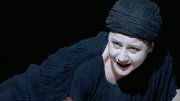
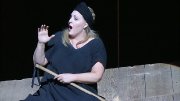
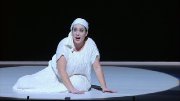
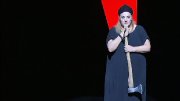
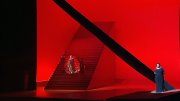
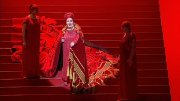

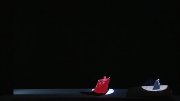
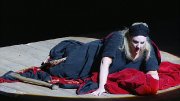
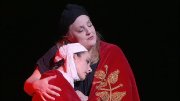
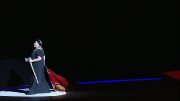
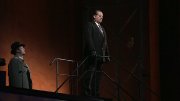
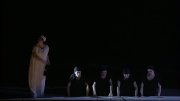
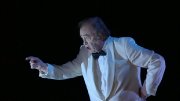
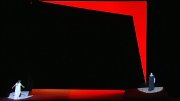







































Your Opinions and Comments
Be the first to post a comment!